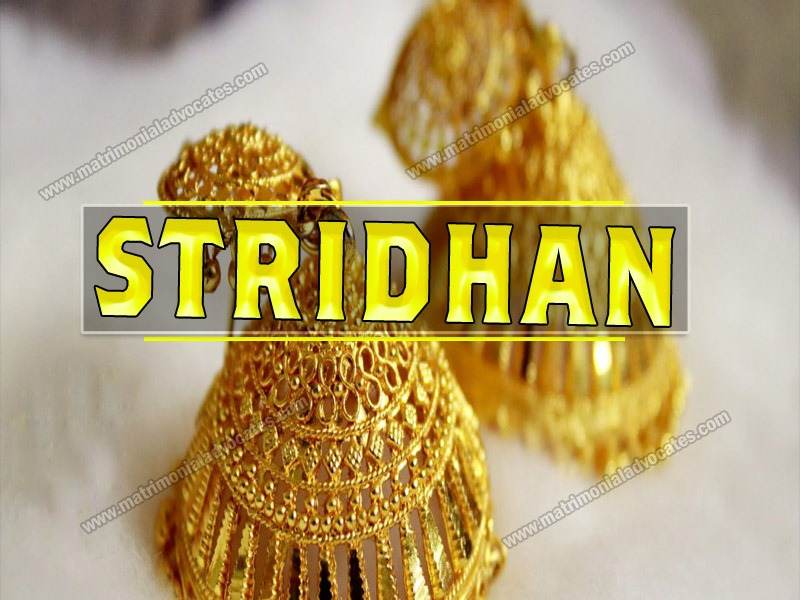
MEANING
The word ‘’Stridhan’ has been derived from the words ‘Stri’ meaning a woman and the word ‘dhana’ means property. Therefore on combining these two words, we get ‘property of woman’ her ‘Stridhan’. This is a concept, which came down all the centuries from the Hindu Smritis but has today, engulfed all forms of marriages in all visible castes and regions.
Stridhan is whatever a woman receives during her life time. Stridhan includes all movable, immovable property gifts etc received by women prior to marriage, at the time of marriage, during child birth and during her widowhood. Women have an absolute right over their Stridhan.
STRIDHAN AND WOMEN ESTATE
Section 14 of Hindu Succession Act 1956 has brought the fundamental change in concept of women’s estate.
Section 14 has abolished women’s estate by converting it into stridhan and woman’s estate and has converted existing woman’s estates into full estates. It has introduced fundamental changes in the traditional Hindu law of property of woman. The objects of this section are:
• To remove all disability of Hindu woman to acquire and deal with property, that is, all the property that she acquires will be her absolute property
. • To convert existing woman’s estate into full estate.
It incorporates the following propositions.
- Any property acquired by a Hindu female after the commencement of the Act will be held by her as her absolute property.
- Any property held by a Hindu female as woman’s estate and is in her possession will also become her property.
- But, if any property is covered by the provision of section 14(2) neither (a) nor (b) above will apply. In other words, if any property is acquired by a Hindu female by way of gift or under a will or any other instrument under a decree or order of a civil court or under an award, and the terms of the gift, will or other instrument or the decree order or award prescribe a restricted estate in such property, she will take it accordingly.
CONSTITUENTS
According to the age-old Smritis, all old schools of Hindu law such as Dayabhaga, Mitakshara etc. and recent Amendments to the law, the following constitutes Stridhan in the hands of a woman whether she is a maiden, married woman or widow;
According to Section 14 of the Hindu Succession Act, 1956 property obtained by a woman from the following sources is her absolute property (unless contrary is mentioned in the terms of device, gift, decree, order or award). Property acquired-
- by inheritance
- By device –through will or a settlement
- At a partition
- In lieu of maintenance
- By gift
- By personal Skill or exertion
- Purchase and prescription –with the help of her own funds
- Acquired in any other manner- property received under a decree or award, or through adverse possession
Gifts that are –
- Made to a woman before the nuptial fire (Adhayagni).
- Gifts made to a woman at the bridal procession (Adhyavaharika).
- Gifts made after marriage by a woman’s husband (Patidatta) husband’s relations or parent’s relations and gifts from sons and relations.
- Made in token of love by father-in-law, mother-in-law.
- Gifts made by father, mother and brother.
- Gifts given by her friends etc.,
RIGHTS OF A WOMAN OVER STRIDHAN
Stridhan has all the characteristics of absolute ownership of property. The stridhan being her absolute property, the female has full rights of its alienation. This means that she can sell, gift, mortgage, lease, and exchange her property. This is entirely true when she is a maiden or a widow. Some restrictions were recognized on her power of alienation, if she were a married woman. For a married woman stridhan falls under two heads:
• The sauadayika (gifts of love and affection)- gifts received by a woman from relations on both sides (parents and husband).
• The non-saudayika- all other types of stridhan such as gifts from stranger, peoperty acquired by self-exertion or mechanical art.
Over the former she has full rights of disposal but over the latter she has no right of alienation without the consent of her husband. The husband also had the power to use it.
SUCCESSION OF STRIDHAN
The Hindu Succession Act, 1956 has abrogated the law relating to Stridhan which existed prior to the incorporation of Section 14 in the Act. Section 14 provided that every property which was in possession of a Hindu female at the time of the enforcement of the Act, whether acquired prior to or subsequent to the Act, became her absolute property. The old law relating to the order of succession to such property has been done away with and a new order of succession has been introduced in its place, which included females as well. A uniform law relating to various categories of heirs has been contained in Section 15 of the Act since every property validly in her possession became her stridhan, a full uniform law of succession to such property had become essential. Thus on the death of a Hindu female intestate, her stridhan devolved according to the rules contained in Section 15 and 16, but in no case according to the old law. Section 15 lays down that when a Hindu female dies intestate leaving her stridhan, it would devolve upon the following categories of heir according to the rules provided in Section 16 of the Act:
a) Firstly, upon sons and daughters(including the children of a predeceased son or daughter) and husband;
b) Secondly, upon the heirs of husband;
c) Thirdly, upon father and mother;
d) Fourthly, upon the heirs of father;
e) Fifthly, upon the heirs of mother;
STRIDHAN AND DOWRY: A DIFFERENCE
Stridhan is very often misinterpreted as dowry even when the law has an entirely different definition for it. The domestic law perceives dowry as any property or valuable security given or agreed by the bride’s side to the family of the bridegroom before, during or after marriage, by exploiting or threatening the girl or her family while Stridhan is a voluntary gift given by members of the bridal side to the bride as a stepping stone to establishing her own property.
However due to Complexities and general ignorance proving what is what can be difficult in the court.
APLLICATION UNDER DIFFERENT LAWS
Hindu Succession Act 1956 & Hindu Marriage Act, 1955
Under Section 14 of the Hindu Succession Act 1956, Stridhan is defined as the property that is acquired by a woman during her marriage. A woman’s right to her Stridhan is protected under Section 14 of the Hindu Succession Act, 1956 R/w Section 27 of the Hindu Marriage Act, 1955 make a female Hindu an absolute owner of such property. If the property is placed under the custody of her husband, in-laws, etc. then they are bound to return that when demanded by her.
Domestic Violence Act, 2005
Section 12 of the Domestic Violence Act, 2005 provides for women right to her Stridhan in cases where she is a victim of domestic violence. The provisions of this law can be easily invoked for the recovery of Stridhan.
Under the residence orders the magistrate may direct the respondent to return to the possession of the aggrieved person her Stridhan or any other property or valuable security to which she is entitled.
Section 405 & 406 of the Indian Penal Code
If some expensive gift such as jewellery is misappropriated by a woman’s in-laws, she or her family can take recourse to legal action under Section 405 of the Indian Penal Code that deals with the punishment for criminal breach of trust. This section of the law reads as follows:
“Whoever, being in any manner entrusted with property, or with any dominion over property, dishonestly misappropriates or converts to his own use that property, or dishonestly uses or disposes of that property in violation of any direction of law prescribing the mode in which such trust is to be discharged, or of any legal contract, express or implied, which he has made touching the discharge of such trust, or willfully suffers any other person so to do, commits ‘criminal breach of trust.” The punishment for doing criminal breach of trust is given under Section 406 IPC which states:
“Whoever commits criminal breach of trust shall be punished with imprisonment of either description for a term which may extend to three years, or with fine, or with both.”
CASE LAWS
Pratibha Rani vs. Suraj Kumar 1985 (2) SCC 370
The Hon’ble Supreme Court of India held that:
“a Hindu married woman is the absolute owner of her Streedhan property and can deal with it in any manner she likes and, even if it is placed in the custody of her husband or her in-laws they would be deemed to be trustees and bound to return the same if and when demanded by her”.
Ashok Laxman Kale vs Ujwala Ashok Kale AIR 2007 (NOC) 1093 (Bom)
The Court held that bride has got an absolute, exclusive dominion over all her Stridhan, received during the marriage. This includes both movable and immovable property, while she has the power to sell, alienate or give it away as she pleases both during her lifetime and thereafter. Her husband and in-law’s family members have no rights over a woman’s Stridhan. We need to understand that the marriage expenses and dowry are not Stridhan.
Rashmi Kumar vs. Mahesh Kumar Bhada (1997) 2 SCC 397
The Supreme Court held in this case that when the wife entrusts her Stridhan property with the dominion over that property to her husband or any other member of the family and the husband or such other member of the family dishonestly misappropriates or converts to his own use that property, or willfully suffers and other person to do so, he commits criminal breach of trust.
CONCLUSION
The existence of Stridhan is an ingrained part of Indian culture from times immemorial. At present the Hindu woman has an absolute right over her Stridhan .She has full rights of its alienation which means she has the power to sell, bifurcate or give it away as she wishes during her lifetime and thereafter. Stridhan includes all movable, immovable property gifts etc received by women prior to marriage, at the time of marriage, during child birth and during her widowhood. Stridhan differs from Dowry in the way that it is the voluntary gifts given to a woman before or after her marriage and has no element of coercion. With the passage of the Hindu Succession Act, 1956, Section 14 has inter alia repealed all the archaic laws and made it crystal clear that all such properties ownership is fully vested upon the women, whether acquired before or after the passage of the Act. The Act confers absolute heritable capacity on the female heir. Section 14 dispenses with the traditional limitations on the powers of the Hindu female to transmit and dispose of property. If she dies leaving behind intestate succession, a uniform succession order shall follow via Section 15 of the Act of 1956.Conclusively, it can be said that the concept of the Stridhan has evolved much.






Hi, My Mom has claimed to get back her Stidhan and property from my father at Vaso Taluka Court (District Kheda, Gujarat), but during her case movement she passed away.
Qs. Am I eligible to get my Mom’s Stridhan from my father that she has demanded?
Please advise how can I can get my Mom’s Stridhan from my father?
As a LR to your mother you can continue with the case.